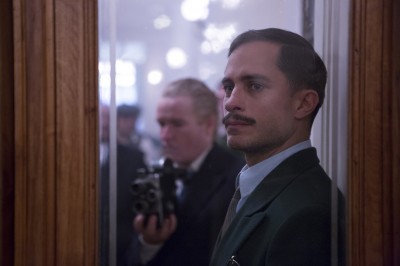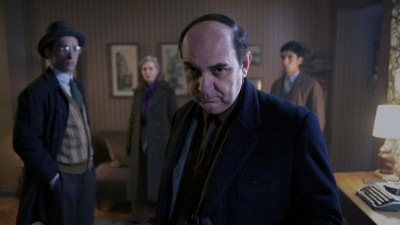| Reviews & Columns |
|
Reviews DVD TV on DVD Blu-ray 4K UHD International DVDs In Theaters Reviews by Studio Video Games Features Collector Series DVDs Easter Egg Database Interviews DVD Talk Radio Feature Articles Columns Anime Talk DVD Savant Horror DVDs The M.O.D. Squad Art House HD Talk Silent DVD
|
DVD Talk Forum |
|
|
| Resources |
|
DVD Price Search Customer Service #'s RCE Info Links |
|
Columns
|
|
|
Neruda
Other // R // December 16, 2016
List Price: Unknown [Buy now and save at Fandango]

Director Pablo Larrain had a few titles to his name, although 2016 would ultimately prove to be a hugely successful year internationally for the filmmaker. After releasing the brilliant Jackie via the Fox Searchlight Pictures brand, he has already earned a Golden Globes nomination for Best Foreign Language Film with Neruda. Only time will tell, although it's likely that both films will ultimately receive some nomination attention at the Oscars. While both historical, they are different features with varying messages. However, his look into the mind of First Lady Jacqueline Kennedy is much more captivating than this biographical drama.
Nobel Prize-winning Chilean poet, Pablo Neruda (Luis Gnecco), thrilled audiences everywhere with his relatable words and charming delivery. When he becomes a fugitive from his home country in the late 1940s for joining the Communist Party, he becomes the topic of controversial talk. Inspector Oscar Peluchonneau (Gael Garcia Bernal) is tasked with tracking Neruda down and bringing him into custody.
The opening scene follows the Chilean senators, as they shout at and insult one another in the men's bathroom. Writer Guillermo Calderón's establishes Neruda's feelings of the government during this time period remarkably well in this particular scene. His insulting remarks towards President Videla quickly place him on the radar of law enforcement. The first half of the film or so is rather straight forward, as audiences follow this cat and mouse chase. Neruda is initially forced to go into hiding, which begins to weigh heavily on him. The isolation drives him to drink more and occasionally go on walks, which he is advised against doing. Neruda is somehow excited by the concept of the cops being close to finding him. The film thrives on this tension, as the narrative follows both the perspectives of the Chilean poet and the inspector. Some of these sequences are quite captivating, as it often feels as if they're having an active conversation without ever actually speaking to one another.
The second half of Neruda is where it takes a turn that viewers will either embrace or reject. Caldron's screenplay introduces a more surreal perspective that goes to places that aren't nearly as enticing. The narrative becomes less about the cat and mouse game that has been unfolding or even the characters themselves, and more about the story's use of strange parallelism. However, this direction doesn't leave much of a lasting impact. We never have the opportunity to get in the mind of Neruda or the investigator, which makes it difficult to feel anything significant towards either of them. The journey itself is consistently entertaining, although even its climax fails to stand out in any memorable way. While certainly not simplistic, it lacks a certain oomph.
The depiction of Neruda may be the biggest factor that will draw some audiences in. He's written as being a trickster in the way that he leads the investigator along the narrative that he has drawn out. The Chilean poet continues to party and live life to the fullest, even while supposedly living in hiding. Meanwhile, the film holds a strong focus on Neruda's poetry in both performance and societal aspects. He meets a dedicated admirer of his work at a party, who clearly moves him on some level. The themes of suffering and the desire for a different life under their government are strong here, which ring through every word of Neruda's poetry. These moments are the films most potent scenes, although the third act doesn't entirely embrace the feature's strengths.
The performances certainly help in elevating some of the material. Luis Gnecco is consistently captivating as Pablo Neruda. He delivers the role with a certain conviction that makes the character's presence more commanding on screen. Gael Garcia Bernal is solid in the role of Oscar Peluchonneau, especially in the voice overs. The parallelism in their sequences is made quite effective through their portrayals, even if the screenplay isn't quite able to make full use of it. Meanwhile, Larrain's visual design is successful in developing an atmosphere that fits the time period to perfection. Neruda is gorgeous to look at, although it could certainly use more work in the script department.
Pablo Larrain's Neruda is Chile's entry into this year's Academy Awards for the Best Foreign Language category, and has already secured a Golden Globes nomination. However, it certainly isn't the best Larrain has to offer in 2016; that honor goes to Jackie. The biggest flaw of this biographical drama is its surreal turn at its midpoint that simply doesn't work. This second half feels as if it belongs in another film entirely, giving the feature an uneven sense of tone. Nevertheless, audiences are treated to a strong visual design and convincing performances. Neruda is intriguing poetry that isn't entirely realized. Rent it.

|
| Popular Reviews |
| Sponsored Links |
|
|
| Sponsored Links |
|
|
| Release List | Reviews | Shop | Newsletter | Forum | DVD Giveaways | Blu-Ray | Advertise |
|
Copyright 2024 DVDTalk.com All Rights Reserved. Legal Info, Privacy Policy, Terms of Use,
Manage Preferences,
Your Privacy Choices | |||||||











